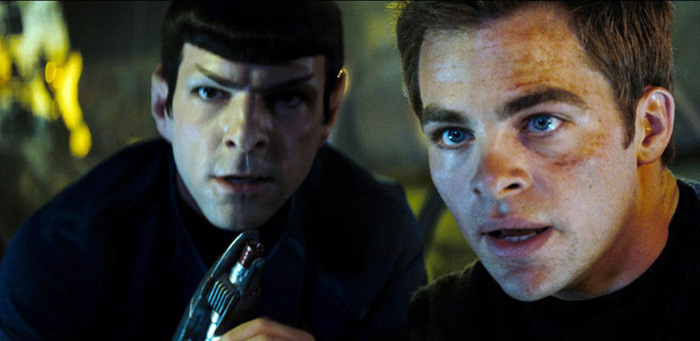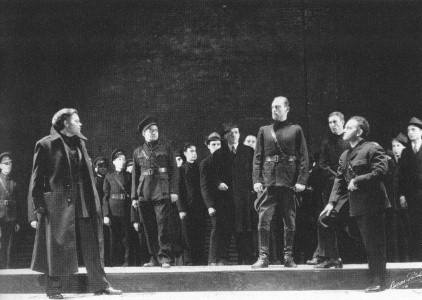In Praise of Remakes

Since tomorrow will see the opening of the much-ballyhooed remake of Star Trek, we’re probably going to be hearing a lot of bellyaching this weekend about how They Don’t Make Anything Original Anymore, Hollywood Is Out of Ideas, etc. etc. etc. So I thought I’d take a moment to offer a contrary opinion.
The short version: remakes aren’t bad. They’re good, and the world would be a more interesting place if we had more of them, not less.
The key to understanding why is this — don’t think about the movies. Think about the theater. Not the movie theater, but the art of live performance on stage.
Plays have been being “remade” for pretty much all of human history. Shakespeare’s works have been mounted on stages around the world for hundreds of years; the works of Euripides, for thousands. In most of these cases the texts are unchanged from the original productions, or at least they are as close to those originals as time and translation will allow.
So where is the howl of protest about how the stage is out of ideas?
It doesn’t exist, for a simple reason — new productions of old texts actually add something to our understanding of those texts. A new director and new actors can take old words — even words that millions know by heart — and put an entirely new spin on them. And by doing so, they can force us to re-examine what we think about the play, and indeed about the world at large.
To see what I mean, one can turn to the early career of Orson Welles. He’s best remembered today for his monumental films like Citizen Kane and The Magnificent Ambersons, but before he went to Hollywood he earned his early fame on the New York stage of the 1930s, mounting visionary productions of Shakespeare classics that took the well-known plays and turned them into commentaries on contemporary social issues: a 1936 Macbeth showing the absurdity of segregation by offering an all-black cast before a backdrop of Haitian voodoo; Julius Caesar reimagined in 1937 as a warning about the rise of fascism, the noble Romans clad in Mussolini-style military uniforms.
One could have asked Welles why he didn’t instead busy himself writing new original scripts rather than re-imagining Shakespeare; but that would have been missing the point. Welles’ productions took on additional power because they were remakes. The politics of the Roman Republic were matters of life and death to the men who took part in them; today, though, they’re matters of academic interest. By picking them up and placing them in a modern context, though, Welles accomplished two things: first, he made them real to contemporary audiences by plundering the symbology of 1930s international politics, which by 1937 were clearly building to something ominous; and second, he showed how Shakespeare’s points about power and ambition are just as true in the modern world as they were in Elizabethan England.
That’s the power of a good remake: by taking something we know and showing it to us from a different angle, it can prompt us to see things in it we had never seen before.
Costuming is just one way a theatrical remake can create that effect; another is casting. Consider the character of Hamlet; over the last century and a half it has been played on stages around the world by a who’s who of the world’s greatest actors: Edwin Booth. John Barrymore. Laurence Olivier. John Gielgud. Kenneth Branagh. Each brought his own interpretation, his own understanding, to the character; each told the familiar story in a way that opened the audience’s eyes anew.
And yet people still complain that it’s sacrilege to have anyone other than William Shatner play James T. Kirk? Give me a break.
Will the new Star Trek be any good? Will Chris Pine‘s performance as Captain Kirk be as memorable as the ones Shatner could occasionally offer? I have no idea.
Not all remakes of Shakespeare are brilliant, after all. Sure, Olivier played Hamlet:
.. but so did Mel Gibson:
… and God knows how many bad Hamlets have graced the stages of high schools and community theaters across the fruited plain. So just because it’s a remake doesn’t mean it’s automatically good.
But — but — it doesn’t mean it’s automatically bad either. All it means is that it’s part of a tradition as old as art itself; one that has, all told, enriched our collective cultural life immeasurably. The interpretations of the geeks and Gibsons are, after all, quickly forgotten; those of the brilliant Oliviers add new layers to the work, layers that can survive long after the actor himself has passed.
Can the same magic happen in film? I don’t see why not. Even when the source material is dreck, a gifted director, writers and cast can turn it into something special; just compare the original Battlestar Galactica to the recently concluded re-imagined version to see what I mean. The former is kitsch; the latter is art.
If it can happen on the small screen, it can happen on the big screen, too. The studios just need to stop looking at remakes as a way to squeeze some quick cash out of a played-out property and start looking at them as ways to create new blockbusters by bringing fresh perspectives to classic stories. All it takes is to bring some imagination to the table.


Comments
Sandy
May 8, 2009
10:29 am
OK, but theater troupes remake Shakespeare, Ibsen, and Williams. Hollywood will remake Parts: The Clonus Horror into The Island.
Jason Lefkowitz
May 8, 2009
10:34 am
Having strong source material helps, but it’s entirely possible for a good remake to be made from a bad original; “Battlestar Galactica” is a good example of this.
Oscar
May 8, 2009
1:15 pm
Did you just imply that the original BSG was not good?! My inner child is seriously angry with you.
Jason Lefkowitz
May 8, 2009
2:47 pm
Go try and actually watch the original BSG today. That oughta shut your inner child up pretty effectively 😉
Sandy
May 10, 2009
12:59 am
For its time, BSG was genius (well, the first 12 episodes). Plus they had boss hair.
And to be completely fair, Star Trek is not a remake of Star Trek: The Motion Picture. It’s a prequel in a pre-existing universe. So it’s going back to the well, but it’s a well that, until a massive dredging effort, had been poisoned with the bloated corpses of Roddenberry, Berman, and Braga. It is not equivalent to Tom Hanks and Meg Ryan giving us radical new insight into the text that is The Little Shop Around the Corner.
But really, what theater troupe redoes crappy off-broadway plays from the 70s? And how many plays are adaptations of movies or books? (Note I said “plays,” not “broadway musicals,” which are to plays as Thomas Kinkaide is to Manet.) I think if you look at the percentages, movies definitely have an originality deficit.
David Jay
May 19, 2009
8:14 pm
Just when you almost had me convinced, I read this. I think you’ve lost me again.
Really, no html tags in comments?
This:
http://movies.yahoo.com/feature/us-magazine-chace-crawford-footloose.html